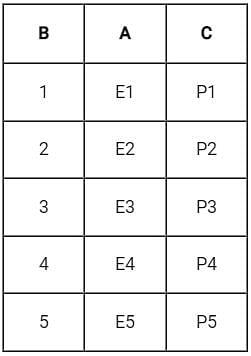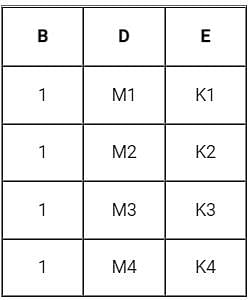Computer Science Engineering (CSE) Exam > Computer Science Engineering (CSE) Questions > Let the following functional dependencies hol...
Start Learning for Free
Let the following functional dependencies hold for relation R1(A, B, C) and R2(B, D, E)
B → A, A → C, the relation R1 contains 35 tuples and relation R2 contains 34 tuples. What is maximum number of tuples possible in natural join R1 and R2?
- a)35
- b)36
- c)34
- d)33
Correct answer is option 'C'. Can you explain this answer?
| FREE This question is part of | Download PDF Attempt this Test |
Most Upvoted Answer
Let the following functional dependencies hold for relation R1(A, B, C...
For given relation R1(A, B, C) and R2(B, D, E), functional dependencies are given only for relation R1, not for R2 And the candidate key for R1 is B, so all 35 value must be unique in R1. To get the maximum number of tuples in output, there can be two possibilities.
- All 34 values of B in R2 are the same and there is an entry in R1 that matches with this value. In this case, we get 34 tuples in output.
Example:
Consider an example, suppose there is two tables R1(A, B, C) consists of 5 tuples and R2( B, D, E) consists of 4 tuples only.


Natural join of R1 and R2 (R1 * R2) gives: 4
Attention Computer Science Engineering (CSE) Students!
To make sure you are not studying endlessly, EduRev has designed Computer Science Engineering (CSE) study material, with Structured Courses, Videos, & Test Series. Plus get personalized analysis, doubt solving and improvement plans to achieve a great score in Computer Science Engineering (CSE).

|
Explore Courses for Computer Science Engineering (CSE) exam
|

|
Similar Computer Science Engineering (CSE) Doubts
Let the following functional dependencies hold for relation R1(A, B, C) and R2(B, D, E)B → A, A → C, the relation R1 contains 35 tuples and relation R2 contains 34 tuples. What is maximum number of tuples possible in natural join R1 and R2?a)35b)36c)34d)33Correct answer is option 'C'. Can you explain this answer?
Question Description
Let the following functional dependencies hold for relation R1(A, B, C) and R2(B, D, E)B → A, A → C, the relation R1 contains 35 tuples and relation R2 contains 34 tuples. What is maximum number of tuples possible in natural join R1 and R2?a)35b)36c)34d)33Correct answer is option 'C'. Can you explain this answer? for Computer Science Engineering (CSE) 2024 is part of Computer Science Engineering (CSE) preparation. The Question and answers have been prepared according to the Computer Science Engineering (CSE) exam syllabus. Information about Let the following functional dependencies hold for relation R1(A, B, C) and R2(B, D, E)B → A, A → C, the relation R1 contains 35 tuples and relation R2 contains 34 tuples. What is maximum number of tuples possible in natural join R1 and R2?a)35b)36c)34d)33Correct answer is option 'C'. Can you explain this answer? covers all topics & solutions for Computer Science Engineering (CSE) 2024 Exam. Find important definitions, questions, meanings, examples, exercises and tests below for Let the following functional dependencies hold for relation R1(A, B, C) and R2(B, D, E)B → A, A → C, the relation R1 contains 35 tuples and relation R2 contains 34 tuples. What is maximum number of tuples possible in natural join R1 and R2?a)35b)36c)34d)33Correct answer is option 'C'. Can you explain this answer?.
Let the following functional dependencies hold for relation R1(A, B, C) and R2(B, D, E)B → A, A → C, the relation R1 contains 35 tuples and relation R2 contains 34 tuples. What is maximum number of tuples possible in natural join R1 and R2?a)35b)36c)34d)33Correct answer is option 'C'. Can you explain this answer? for Computer Science Engineering (CSE) 2024 is part of Computer Science Engineering (CSE) preparation. The Question and answers have been prepared according to the Computer Science Engineering (CSE) exam syllabus. Information about Let the following functional dependencies hold for relation R1(A, B, C) and R2(B, D, E)B → A, A → C, the relation R1 contains 35 tuples and relation R2 contains 34 tuples. What is maximum number of tuples possible in natural join R1 and R2?a)35b)36c)34d)33Correct answer is option 'C'. Can you explain this answer? covers all topics & solutions for Computer Science Engineering (CSE) 2024 Exam. Find important definitions, questions, meanings, examples, exercises and tests below for Let the following functional dependencies hold for relation R1(A, B, C) and R2(B, D, E)B → A, A → C, the relation R1 contains 35 tuples and relation R2 contains 34 tuples. What is maximum number of tuples possible in natural join R1 and R2?a)35b)36c)34d)33Correct answer is option 'C'. Can you explain this answer?.
Solutions for Let the following functional dependencies hold for relation R1(A, B, C) and R2(B, D, E)B → A, A → C, the relation R1 contains 35 tuples and relation R2 contains 34 tuples. What is maximum number of tuples possible in natural join R1 and R2?a)35b)36c)34d)33Correct answer is option 'C'. Can you explain this answer? in English & in Hindi are available as part of our courses for Computer Science Engineering (CSE).
Download more important topics, notes, lectures and mock test series for Computer Science Engineering (CSE) Exam by signing up for free.
Here you can find the meaning of Let the following functional dependencies hold for relation R1(A, B, C) and R2(B, D, E)B → A, A → C, the relation R1 contains 35 tuples and relation R2 contains 34 tuples. What is maximum number of tuples possible in natural join R1 and R2?a)35b)36c)34d)33Correct answer is option 'C'. Can you explain this answer? defined & explained in the simplest way possible. Besides giving the explanation of
Let the following functional dependencies hold for relation R1(A, B, C) and R2(B, D, E)B → A, A → C, the relation R1 contains 35 tuples and relation R2 contains 34 tuples. What is maximum number of tuples possible in natural join R1 and R2?a)35b)36c)34d)33Correct answer is option 'C'. Can you explain this answer?, a detailed solution for Let the following functional dependencies hold for relation R1(A, B, C) and R2(B, D, E)B → A, A → C, the relation R1 contains 35 tuples and relation R2 contains 34 tuples. What is maximum number of tuples possible in natural join R1 and R2?a)35b)36c)34d)33Correct answer is option 'C'. Can you explain this answer? has been provided alongside types of Let the following functional dependencies hold for relation R1(A, B, C) and R2(B, D, E)B → A, A → C, the relation R1 contains 35 tuples and relation R2 contains 34 tuples. What is maximum number of tuples possible in natural join R1 and R2?a)35b)36c)34d)33Correct answer is option 'C'. Can you explain this answer? theory, EduRev gives you an
ample number of questions to practice Let the following functional dependencies hold for relation R1(A, B, C) and R2(B, D, E)B → A, A → C, the relation R1 contains 35 tuples and relation R2 contains 34 tuples. What is maximum number of tuples possible in natural join R1 and R2?a)35b)36c)34d)33Correct answer is option 'C'. Can you explain this answer? tests, examples and also practice Computer Science Engineering (CSE) tests.

|
Explore Courses for Computer Science Engineering (CSE) exam
|

|
Suggested Free Tests
Signup for Free!
Signup to see your scores go up within 7 days! Learn & Practice with 1000+ FREE Notes, Videos & Tests.
























